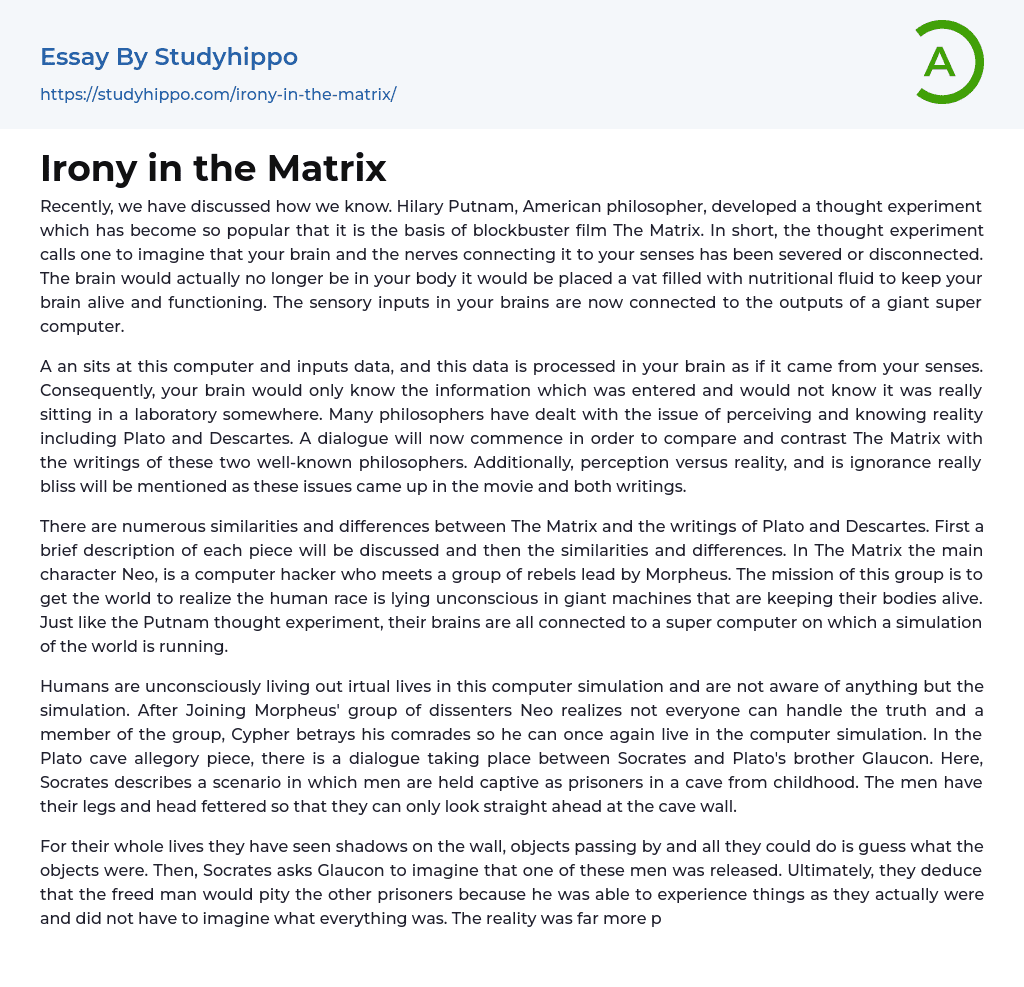Recently, we have discussed how we know. Hilary Putnam, American philosopher, developed a thought experiment which has become so popular that it is the basis of blockbuster film The Matrix. In short, the thought experiment calls one to imagine that your brain and the nerves connecting it to your senses has been severed or disconnected. The brain would actually no longer be in your body it would be placed a vat filled with nutritional fluid to keep your brain alive and functioning. The sensory inputs in your brains are now connected to the outputs of a giant super computer.
A an sits at this computer and inputs data, and this data is processed in your brain as if it came from your senses. Consequently, your brain would only know the information which was entered and would not know it wa
...s really sitting in a laboratory somewhere. Many philosophers have dealt with the issue of perceiving and knowing reality including Plato and Descartes. A dialogue will now commence in order to compare and contrast The Matrix with the writings of these two well-known philosophers. Additionally, perception versus reality, and is ignorance really bliss will be mentioned as these issues came up in the movie and both writings.
There are numerous similarities and differences between The Matrix and the writings of Plato and Descartes. First a brief description of each piece will be discussed and then the similarities and differences. In The Matrix the main character Neo, is a computer hacker who meets a group of rebels lead by Morpheus. The mission of this group is to get the world to realize the human race is
lying unconscious in giant machines that are keeping their bodies alive. Just like the Putnam thought experiment, their brains are all connected to a super computer on which a simulation of the world is running.
Humans are unconsciously living out irtual lives in this computer simulation and are not aware of anything but the simulation. After Joining Morpheus' group of dissenters Neo realizes not everyone can handle the truth and a member of the group, Cypher betrays his comrades so he can once again live in the computer simulation. In the Plato cave allegory piece, there is a dialogue taking place between Socrates and Plato's brother Glaucon. Here, Socrates describes a scenario in which men are held captive as prisoners in a cave from childhood. The men have their legs and head fettered so that they can only look straight ahead at the cave wall.
For their whole lives they have seen shadows on the wall, objects passing by and all they could do is guess what the objects were. Then, Socrates asks Glaucon to imagine that one of these men was released. Ultimately, they deduce that the freed man would pity the other prisoners because he was able to experience things as they actually were and did not have to imagine what everything was. The reality was far more precious than his imagination. The third writing comes from Meditation I from Meditations on First Philosophy by Rene Descartes who offers some reasons to doubt his senses. In
- Albert Camus essays
- Aristotle essays
- Carl Jung essays
- Henry David Thoreau essays
- Immanuel Kant essays
- John Dewey essays
- Karl Marx essays
- Machiavelli essays
- Michel Foucault essays
- Plato essays
- Rene Descartes essays
- Rousseau essays
- Socrates essays
- Thomas Hobbes essays
- 12 Angry Men essays
- A beautiful mind essays
- A Separation essays
- Alfred Hitchcock essays
- American Beauty essays
- American Films essays
- Animation essays
- Avatar essays
- Blade Runner essays
- Bollywood essays
- Bond essays
- Bridge essays
- Cinema Of The United States essays
- Comedies essays
- David essays
- Dead Poets Society essays
- Do The Right Thing essays
- Documentary essays
- English-Language Films essays
- Erin Brockovich essays
- Film Analysis essays
- Film Editing essays
- Film Noir essays
- Film Techniques essays
- Finding Forrester essays
- Forrest Gump essays
- Gattaca essays
- Gladiator essays
- Glory essays
- Good Will Hunting essays
- Hamilton essays
- Hollywood essays
- Horror essays
- Jaws essays
- King kong essays
- Like Water For Chocolate essays




